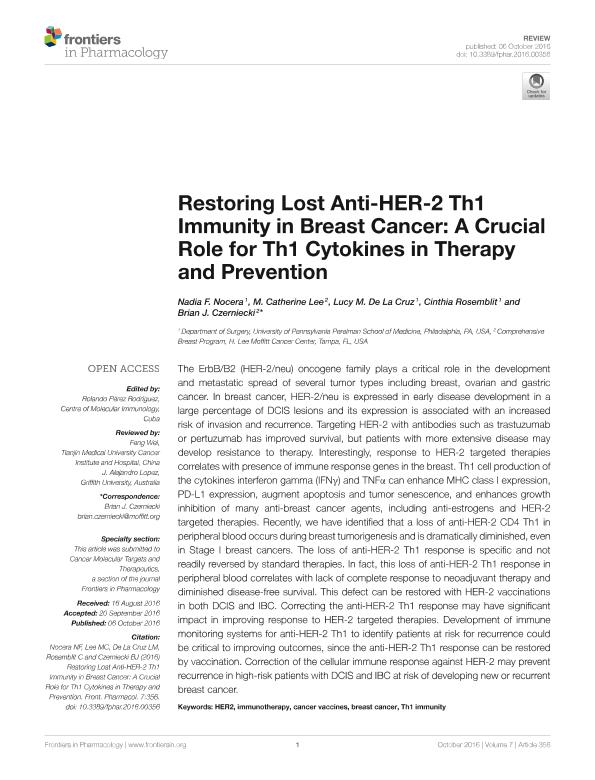Mostrar el registro sencillo del ítem
dc.contributor.author
Nocera, Nadia F.
dc.contributor.author
Lee, M. Catherine
dc.contributor.author
De La Cruz, Lucy M.
dc.contributor.author
Rosemblit, Cinthia

dc.contributor.author
Czerniecki, Brian J.
dc.date.available
2018-06-06T20:32:27Z
dc.date.issued
2016-10
dc.identifier.citation
Nocera, Nadia F.; Lee, M. Catherine; De La Cruz, Lucy M.; Rosemblit, Cinthia; Czerniecki, Brian J.; Restoring Lost Anti-HER-2 Th1 Immunity in Breast Cancer: A Crucial Role for Th1 Cytokines in Therapy and Prevention; Frontiers Research Foundation; Frontiers in Pharmacology; 7; 10-2016; 1-12
dc.identifier.issn
1663-9812
dc.identifier.uri
http://hdl.handle.net/11336/47602
dc.description.abstract
The ErbB/B2 (HER-2/neu) oncogene family plays a critical role in the development and metastatic spread of several tumor types including breast, ovarian and gastric cancer. In breast cancer, HER-2/neu is expressed in early disease development in a large percentage of DCIS lesions and its expression is associated with an increased risk of invasion and recurrence. Targeting HER-2 with antibodies such as trastuzumab or pertuzumab has improved survival, but patients with more extensive disease may develop resistance to therapy. Interestingly, response to HER-2 targeted therapies correlates with presence of immune response genes in the breast. Th1 cell production of the cytokines interferon gamma (IFNγ) and TNFα can enhance MHC class I expression, PD-L1 expression, augment apoptosis and tumor senescence, and enhances growth inhibition of many anti-breast cancer agents, including anti-estrogens and HER-2 targeted therapies. Recently, we have identified that a loss of anti-HER-2 CD4 Th1 in peripheral blood occurs during breast tumorigenesis and is dramatically diminished, even in Stage I breast cancers. The loss of anti-HER-2 Th1 response is specific and not readily reversed by standard therapies. In fact, this loss of anti-HER-2 Th1 response in peripheral blood correlates with lack of complete response to neoadjuvant therapy and diminished disease-free survival. This defect can be restored with HER-2 vaccinations in both DCIS and IBC. Correcting the anti-HER-2 Th1 response may have significant impact in improving response to HER-2 targeted therapies. Development of immune monitoring systems for anti-HER-2 Th1 to identify patients at risk for recurrence could be critical to improving outcomes, since the anti-HER-2 Th1 response can be restored by vaccination. Correction of the cellular immune response against HER-2 may prevent recurrence in high-risk patients with DCIS and IBC at risk of developing new or recurrent breast cancer.
dc.format
application/pdf
dc.language.iso
eng
dc.publisher
Frontiers Research Foundation

dc.rights
info:eu-repo/semantics/openAccess
dc.rights.uri
https://creativecommons.org/licenses/by-nc-sa/2.5/ar/
dc.subject
Breast Cancer
dc.subject
Cancer Vaccines
dc.subject
Her2
dc.subject
Immunotherapy
dc.subject
Th1 Immunity
dc.subject.classification
Otras Ciencias Biológicas

dc.subject.classification
Ciencias Biológicas

dc.subject.classification
CIENCIAS NATURALES Y EXACTAS

dc.title
Restoring Lost Anti-HER-2 Th1 Immunity in Breast Cancer: A Crucial Role for Th1 Cytokines in Therapy and Prevention
dc.type
info:eu-repo/semantics/article
dc.type
info:ar-repo/semantics/artículo
dc.type
info:eu-repo/semantics/publishedVersion
dc.date.updated
2018-06-06T19:44:18Z
dc.journal.volume
7
dc.journal.pagination
1-12
dc.journal.pais
Suiza

dc.description.fil
Fil: Nocera, Nadia F.. University of Pennsylvania; Estados Unidos
dc.description.fil
Fil: Lee, M. Catherine. H. Lee Moffitt Cancer Center; Estados Unidos
dc.description.fil
Fil: De La Cruz, Lucy M.. University of Pennsylvania; Estados Unidos
dc.description.fil
Fil: Rosemblit, Cinthia. University of Pennsylvania; Estados Unidos
dc.description.fil
Fil: Czerniecki, Brian J.. H. Lee Moffitt Cancer Center; Estados Unidos
dc.journal.title
Frontiers in Pharmacology
dc.relation.alternativeid
info:eu-repo/semantics/altIdentifier/doi/https://dx.doi.org/10.3389/fphar.2016.00356
dc.relation.alternativeid
info:eu-repo/semantics/altIdentifier/url/https://www.frontiersin.org/articles/10.3389/fphar.2016.00356/full
Archivos asociados
